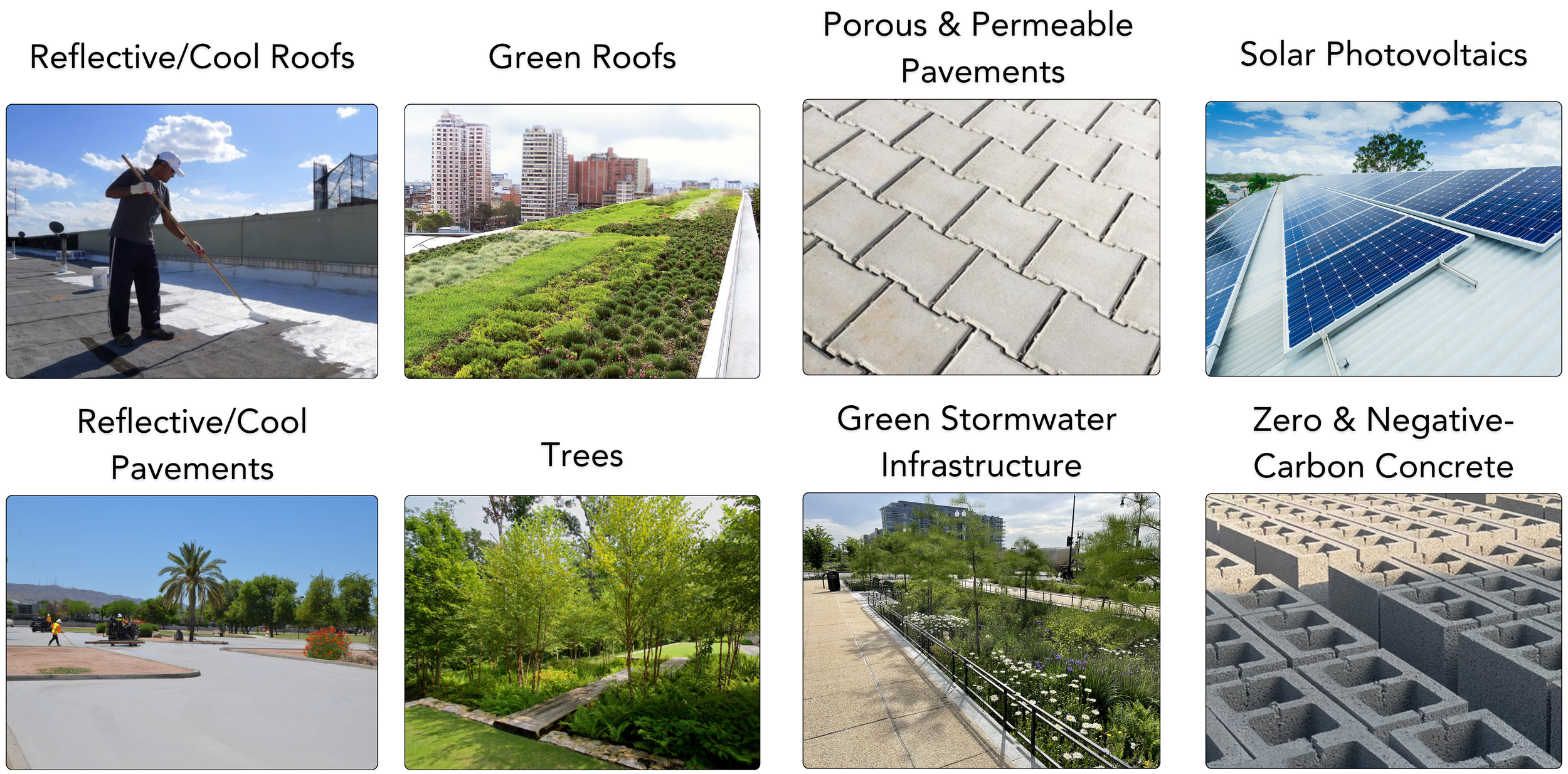Cities for Smart Surfaces Project: Transforming Urban Environments
APHA is excited to partner with the Smart Surfaces Coalition on the Cities for Smart Surfaces project, along with the National League of Cities, Metropolitan AME, American Lung Association and many others.
This groundbreaking project brings together six APHA affiliates from across the country to explore the potential of smart surfaces to improve public health in urban environments.
Newly released: APHA's Smart Surface Video.
See how APHA and local partners are using smart surfaces to combat extreme heat, flooding, and climate inequities in cities across America.
Urban Heat Islands and our City Surfaces
As climate change accelerates, cities are experiencing more extreme heat issues. The urban heat island effect is exacerbated by our man-made built surfaces; Urban neighborhoods can be 15-20°F warmer than surrounding areas due to heat-absorbing surfaces like asphalt and dark roofs and lack of natural vegetation. Two-thirds of U.S. cities are made of these dark and non-porous surfaces, contributing to urban heat while increasing air pollution, flooding, and poorer health outcomes.
- Urban heat is a health equity issue, with low-income and historically redlined communities facing more heat issues than other neighborhoods.
- Climate change will exacerbate heat issues; for every .1°C of warming above present levels, about 140 million more people will be exposed to dangerous heat.
- Extreme heat events cause more deaths annually than hurricanes, floods, and tornadoes combined.
- Heat-trapping surfaces increase ground-level ozone and fine particle pollution, which damage our lungs and are linked to health consequences.
Why do we need Smart Surfaces?
Smart surfaces use reflective technology and/or natural cooling vegetation to help cities withstand the health effects of climate change. Smart Surfaces offer a proven, cost-effective path to protect health, improve equity, and build climate resilience.
Smart surfaces build climate resilience and improve public health by:
- Mitigating extreme heat. As global temperatures rise, cities face more frequent and intense heat waves. Smart surfaces like reflective roofs and green spaces help cool urban areas, reducing the risk of heat-related illnesses.
- Preventing flooding. Intense rainfall events lead to urban flooding. Smart surfaces like rain gardens and permeable pavements manage stormwater effectively, preventing floods and safeguarding communities.
- Reducing heat-related illnesses. Extreme heat poses a significant health risk, especially for vulnerable populations. Smart surfaces mitigate heat island effects, making cities healthier and more livable.
- Improving air quality. Trees, green roofs and reflective pavements improve air quality by absorbing pollutants and reducing emissions. Cleaner air translates to better respiratory health for residents.
- Boosting mental well-being. Access to green spaces and aesthetically pleasing environments positively impacts mental health. Smart surfaces enhance urban aesthetics, promoting well-being.
What’s new with Smart Surfaces?
The Nation’s Health Smart Surfaces Special Section
- Check out the latest Nation's Health Issue Special Section, showcasing APHA's Smart Surface work. The section has information about the project, as well as new advancements in Smart Surface work!
- On September 21, during Climate Week NYC, Smart Surfaces hosted an interactive session on how data-driven tools are shaping real policy change in U.S. cities. Watch this session to see how cities can transform urban built surfaces into climate-resilient infrastructure and improve public health through Smart Surfaces implementation.
- This summer, Smart Surfaces launched a host of new tools analyzing the potential of smart surface investments for cities in the coalition. Tools available include a Benefit-Cost Analysis Tool, a Decision Support Tool, and the Smart Surfaces Policy Tracker. These tools can be used to analyze Smart Surfaces policies in your community!
What are Smart Surfaces?

Reflective roofs and pavements: Reflective roofs and pavements are light-colored and are engineered to reflect most sunlight. Comparatively, traditional dark-colored roofs and pavements absorb much more sunlight and heat, increasing cooling costs and energy consumption while emitting more heat.
Green roofs: Green roofs incorporate naturally cooling vegetation in rooftops. Green roofs vary in plant type and density, but consistently reduce heat absorption, improve air quality, and reduce stormwater runoff.
Porous and permeable pavements: Porous and permeable pavements allow rain to run through them to recharge groundwater. These pavements are very helpful in reducing stormwater runoff and flood risk. They can also lower temperatures through evaporative cooling.
Trees: Incorporation of urban forests reduces ambient temperatures by providing shade, therefore increasing comfort for pedestrians and lowering energy consumption. Additionally, trees reduce flood risk by slowing down runoff rate and improve health outcomes by removing pollutants from the air.
Solar Panels: Solar panels generate clean energy while reducing heat absorption. This allows cities to cut emissions while improving air quality. Solar panels can also provide shading for the buildings and sidewalks, therefore further reducing urban heat.
Rain gardens: Rain gardens, or bioretention systems, allow for more water drainage, therefore reducing flood risk. The natural vegetation cools the surrounding environment and provides habitats for native plants and wildlife.
Bring Smart Surfaces to Your Community
Check out the Smart Surfaces Peer Learning Network, which supports a rapidly growing community of urban infrastructure practitioners interested in adopting Smart Surfaces as a cost-effective way to combat extreme heat and stormwater flooding, address environmental injustice, improve public health, save money, and slow global warming.
The Smart Surfaces Policy Help Desk provides policy research and answers policy-related questions for your city.
Stay Connected!
We invite you to follow along with the Cities for Smart Surfaces initiative as it unfolds. We will be sharing updates on the project's progress, key findings, and resources on this webpage. Additionally, you can connect with us on social media using the hashtag #CitiesForSmartSurfaces.
For more information, contact Shweta Arya, Senior Project Manager Smart Surfaces, Center for Climate, Health, and Equity at [email protected].
Together, we can build cooler, healthier and more sustainable cities for all!

.jpg?language=en)
